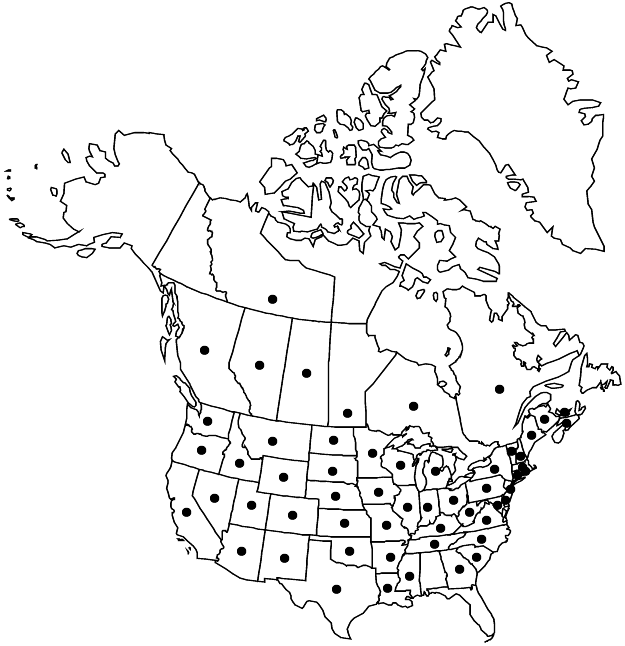Difference between revisions of "Polygonum ramosissimum"
Fl. Bor.-Amer. 1: 237. 1803.
FNA>Volume Importer |
FNA>Volume Importer |
||
| Line 17: | Line 17: | ||
}}<!-- | }}<!-- | ||
| − | --><span class="statement" id="st-undefined" data-properties=""><b>Plants </b>yellowish green or bluish green, (dark brown to black after drying in < | + | --><span class="statement" id="st-undefined" data-properties=""><b>Plants </b>yellowish green or bluish green, (dark brown to black after drying in <i></i>subsp.<i> prolificum</i>), heterophyllous or homophyllous. <b>Stems</b> erect, usually profusely branched in distal 1/2, not wiry, 10–100(–200) cm. <b>Leaves</b>: ocrea 6–12(–15) mm, proximal part cylindric, distal part silvery, soon disintegrating into persistent brown fibers; petiole 2–4 mm; blade variable, light yellowish green to bluish green, proximal often caducous, narrowly elliptic, lanceolate, or oblanceolate, rarely ovate, 8–70 × 4–18(–35) mm, margins flat, apex acute to acuminate or obtuse; distal leaves, either overtopping or shorter than or equaling flowers. <b>Inflorescences</b> axillary or axillary and terminal, spikelike; cymes uniformly distributed or crowded toward tips of branches, 2–5-flowered. <b>Pedicels</b> enclosed in or exserted from ocreae, 1–6 mm. <b>Flowers</b> closed; perianth (2–)2.2–3.6(–4) mm; tube 20–38% of perianth length; tepals overlapping, greenish yellow with greenish yellow or yellow, rarely pink or white, margins, petaloid or sepaloid, not keeled, elliptic to oblong, cucullate; midveins thickened or not; stamens 3–6(–8). <b>Achenes</b> enclosed in or exserted from perianth, dark brown, ovate, 3-gonous, 1.6–3.5 mm, faces subequal, concave, apex not beaked, edges straight, shiny or dull, usually smooth to roughened, sometimes uniformly or obscurely tubercled; late-season achenes common, 4–15 mm.</span><!-- |
-->{{Treatment/Body | -->{{Treatment/Body | ||
| Line 45: | Line 45: | ||
-->{{#Taxon: | -->{{#Taxon: | ||
name=Polygonum ramosissimum | name=Polygonum ramosissimum | ||
| − | |||
|authority=Michaux | |authority=Michaux | ||
|rank=species | |rank=species | ||
| Line 57: | Line 56: | ||
|publication year=1803 | |publication year=1803 | ||
|special status= | |special status= | ||
| − | |source xml=https://jpend@bitbucket.org/aafc-mbb/fna-data-curation.git/src/ | + | |source xml=https://jpend@bitbucket.org/aafc-mbb/fna-data-curation.git/src/f50eec43f223ca0e34566be0b046453a0960e173/coarse_grained_fna_xml/V5/V5_1122.xml |
|subfamily=Polygonaceae subfam. Polygonoideae | |subfamily=Polygonaceae subfam. Polygonoideae | ||
|genus=Polygonum | |genus=Polygonum | ||
Revision as of 21:50, 16 December 2019
Plants yellowish green or bluish green, (dark brown to black after drying in subsp. prolificum), heterophyllous or homophyllous. Stems erect, usually profusely branched in distal 1/2, not wiry, 10–100(–200) cm. Leaves: ocrea 6–12(–15) mm, proximal part cylindric, distal part silvery, soon disintegrating into persistent brown fibers; petiole 2–4 mm; blade variable, light yellowish green to bluish green, proximal often caducous, narrowly elliptic, lanceolate, or oblanceolate, rarely ovate, 8–70 × 4–18(–35) mm, margins flat, apex acute to acuminate or obtuse; distal leaves, either overtopping or shorter than or equaling flowers. Inflorescences axillary or axillary and terminal, spikelike; cymes uniformly distributed or crowded toward tips of branches, 2–5-flowered. Pedicels enclosed in or exserted from ocreae, 1–6 mm. Flowers closed; perianth (2–)2.2–3.6(–4) mm; tube 20–38% of perianth length; tepals overlapping, greenish yellow with greenish yellow or yellow, rarely pink or white, margins, petaloid or sepaloid, not keeled, elliptic to oblong, cucullate; midveins thickened or not; stamens 3–6(–8). Achenes enclosed in or exserted from perianth, dark brown, ovate, 3-gonous, 1.6–3.5 mm, faces subequal, concave, apex not beaked, edges straight, shiny or dull, usually smooth to roughened, sometimes uniformly or obscurely tubercled; late-season achenes common, 4–15 mm.
Distribution

North America.
Discussion
Subspecies 2 (2 in the flora).
Polygonum ramosissimum exhibits considerable morphological complexity and is similar in difficulty to the P. aviculare complex. Further research is necessary to understand the infraspecific variability of this species (M. Costea and F. J. Tardif 2003b).
Selected References
None.
Key
| 1 | Plants heterophyllous, usually yellowish green when fresh or dried; apices of leaf blades acute to acuminate; pedicels 2.5-6 mm | Polygonum ramosissimum subsp. ramosissimum |
| 1 | Plants homophyllous, bluish green when fresh, dark brown or black after drying; apices of leaf blades rounded or obtuse; pedicels 1-2 mm | Polygonum ramosissimum subsp. prolificum |